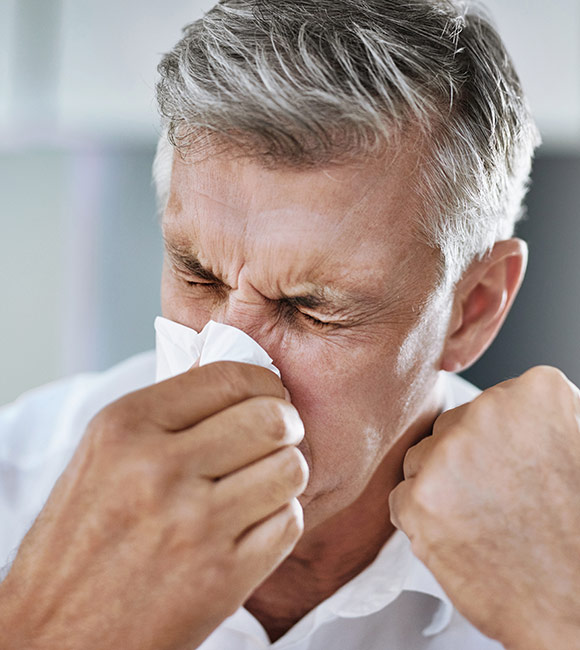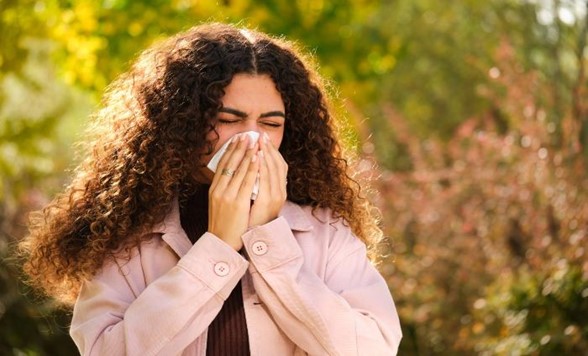Allergy FAQs in Fort Worth, TX

Allergy FAQ: What You Need to Know
Sneezing, runny noses, and the occasional cough aren’t any cause for concern. However, when an allergic reaction causes these symptoms, you might benefit from ENT care. At Expert ENT Care, we help people in Fort Worth, TX manage their allergies and minimize those pesky symptoms. Over the years, we’ve gotten lots of questions from our patients, and we’re glad to provide answers. Take a look at our FAQ about allergies to learn more about this commonplace condition.
What Are the Signs of Allergies?
Common symptoms vary widely, but common signs of allergies include sneezing, itchy or runny nose, red or watery eyes, and hives on the skin. In more severe cases, an allergic reaction may lead to difficulty breathing, swelling of the face or throat, or even anaphylaxis, which requires immediate medical attention. It’s essential to monitor these symptoms and seek help right away when you or a loved one is exposed to an allergen.
What Causes Allergies?
In brief, allergies are the body’s way of reacting to substances it considers harmful, even if those substances aren’t dangerous to most people. During an allergic reaction, the immune system sees a threat and overreacts, causing signs of allergies like itching and swelling.
Whether you develop allergies is influenced by several factors, including genetics and environmental conditions. If one or both of your parents have allergies, you’re more likely to develop them as well. Additionally, exposure to allergens at an early age can increase the risk of a future allergy.

Are Allergies Contagious?
While allergies can be passed down from parent to child, they are not contagious. Allergies are linked to a specific person’s immune response, so they can’t be spread from person to person through casual contact. Even if someone is having a severe allergic reaction, their allergy poses no risk to the people around them.
Do ENTs Treat Allergies?
Yes! ENTs like Dr. Fewins have specialized knowledge about the signs of allergies and the best ways to treat them. Schedule an appointment with our team for guidance specific to your condition.
How Does Allergy Testing Work?
Allergy testing is incredibly useful for people who don’t know what triggers their allergic reactions. Testing typically begins with a comprehensive medical history and discussion of symptoms. Once potential allergens are identified, we can recommend one of these testing methods for further insight:
- Skin Tests—A skin test involves applying small amounts of various allergens to the skin. If an allergic reaction, such as redness or swelling, occurs, the patient is sensitive to that allergen. Skin tests provide fast results and are commonly used for environmental allergens, such as pollen and pet dander.
- Blood Tests—Blood tests measure the levels of allergen-specific antibodies in the bloodstream. While blood tests involve waiting for lab results, they are especially useful for patients with skin conditions or those taking antihistamines that might interfere with skin testing.
Can Pollen Make Your Nose Bleed?
Pollen can contribute to nosebleeds, especially if you already have allergies. During high pollen seasons, the nose can become inflamed and irritated, leading to symptoms such as sneezing, congestion, and itching. This irritation can make the nasal passages more susceptible to dryness and cracking, eventually leading to nosebleeds. Additionally, frequent nose blowing or rubbing in response to allergy symptoms can worsen this irritation.
Staying hydrated, using nasal sprays, and taking prescribed allergy medications can all help prevent nosebleeds during pollen-heavy parts of the year. If nosebleeds persist, consult a healthcare provider, as an underlying condition could be causing them.

How Can I Manage Seasonal Allergies?
Many people dread getting seasonal allergies as spring and summer roll around. Fortunately, there are several strategies you can use to manage this annual problem. Here are our tips for minimizing the effects of seasonal allergies:
- Keep Windows Closed—Use air conditioning to cool your home instead of opening windows. Wide-open windows can allow pollen and other allergens to enter.
- Shower and Change Clothes—After spending time outside, shower and change clothes to remove pollen from your body and clothing.
- Use Allergen-Proof Bedding—Use allergen-proof covers on mattresses, pillows, and box springs to reduce exposure to dust mites.
- Vacuum Often—Vacuum your home frequently to trap pet dander and dust mites. Make sure your vacuum cleaner is equipped with a HEPA filter.
- Stay Inside When Possible—If you can, aim to be indoors during peak pollen times. Pollen counts are usually highest in the early morning and late afternoon.
Contact Expert ENT Care to Learn More
Do you still have questions about allergies? Allergies are specific to each individual, and our team offers personalized care for this chronic issue and more. Dr. Fewins at Expert ENT Care would be glad to help you manage your allergic reactions. Contact us today to get started.
